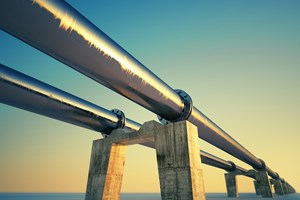New Orleans aims to secure fresh water with $120-$200 million pipeline project
(UI) — While not yet finalized, the New Orleans Sewerage and Water Board is actively pursuing an ambitious endeavor to secure a consistent supply of fresh water for the city's residents, according to WWL-TV.
Saltwater infiltration from the Gulf of Mexico has advanced up the Mississippi River, with its leading edge now approximately 20 miles south of the city in Jesuit Bend.
At present, the Mississippi River flows at a rate of 150 thousand cubic feet per second, which is only half of what is required to prevent saltwater intrusion, according to Army Corps of Engineers commander Col. Cullen Jones.
In response, water board officials recently briefed city council members, outlining plans for a 10-12-mile-long pipeline. This pipeline would facilitate the withdrawal of water from a location north of Kenner, situated above the encroaching saltwater wedge.
SWBNO Deputy Superintendent Steve Nelson told WWL-TV, "o be able to end up with an intake at that location and pump and pipe that downstream into our intakes and as well as Jefferson Parish’s does remain our most viable option."
The cost estimate for this project ranges from $120 million to $200 million.
New Orleans Director of Homeland Security and Emergency Preparedness Colin Arnold views this as an opportunity to proactively address the situation before it significantly impacts the broader water districts in the region. It could serve as a lasting solution for potential future occurrences. President Biden has approved an emergency declaration for Jefferson – Orleans, Plaquemines, and St. Bernard Parishes, potentially unlocking federal funds to maintain a supply of fresh water.
Nelson stressed the importance of the federal declaration to WWL-TV saying, "It opens the door for any number of solutions that we’re talking about." City officials have already secured commitments from five manufacturers to supply the necessary pipes for the 10-12-mile water pipeline and have identified the required contractors.
The city is also collaborating with the state to cover the project's expenses, which will be executed in stages. Arnold is optimistic about having the infrastructure in place by the end of the month. Additionally, support is on the way for the city's smaller west bank water plant in Algiers, expected to receive barge shipments of water from the Army Corps of Engineers and specialized filters capable of desalinating saltwater. According to the latest forecasts, saltwater impacts are anticipated at the Algiers plant on October 22, with Carrollton plant experiencing them a week later. Based on these projections, saltwater intrusion could persist through at least January.
Related News
From Archive

- Glenfarne Alaska LNG targets late-2026 construction start for 807-mile pipeline project
- U.S. water reuse boom to fuel $47 billion in infrastructure spending through 2035
- $2.3 billion approved to construct 236-mile Texas-to-Gulf gas pipeline
- Major water pipe break in Puerto Rico hits over 165,000 customers
- Potomac River Tunnel project enters construction phase beneath Washington, D.C.
- Pennsylvania American Water launches interactive map to identify, replace lead water service lines
- Trump's tariffs drive $33 million cost increase for Cincinnati sewer project
- Utah city launches historic $70 million tunnel project using box jacking under active rail line
- Tulsa residents warned after sewer lines damaged by boring work
- Fatal trench collapse halts sewer construction in Massachusetts; two workers hospitalized




Comments